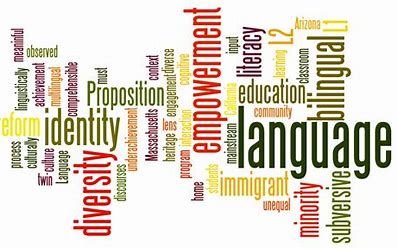Hi everyone

I haven't posted in some time as I changed jobs, re-located internationally and started my third and final module of my 'MA in Online Education', so exciting times, considering we are still at the height of the pandemic; we seem to have found some real sound vaccine candidates and Trump has been voted out of office. But I think the obsessing over whether Americans truly want to go back to slavery and or segregation days is not going away because they voted for him again. Over 40% of US voters chose Nazism in 2020. As I am a person of colour, the fact he once again won white male and female Americans does not seem to me like racism is a thing of the past when so many people vote for someone who openly advocates it. The UK has parallels.
Which brings me to the topic of my post, which is sociolinguistics. This final module of my studies is about choosing a content area to match with the tech skills and online teaching concepts and principles I've been learning. I chose applied linguistics as my content area. This week was sociolinguistics - how more influential social context is than any other influence on language. In fact, language is a product of social interaction, forming everything we communicate using language tools. I can also apply what I learned to life and the language legacy I leave and am a product of.
Of course, one of the best known sociolinguists was Dell Hymes (1972), who made the point that most linguists are much less concerned with an ideal ‘linguistic competence’ than with ‘communicative performance’ - real world applications of language. Hymes’ ideas for communicative language teaching were part of an enrichment of approaches in education of the time, beginning in the 70s and 80s. Though his ideas ‘quickly became distorted and misinterpreted’ (Cook, 2003 p.46), they helped create the impetus towards sociolinguistics. There were some excellent examples from students on my course on the topic of code-switching for students of English applying Hymes’ proposed four types of knowledge (Cook, 2003 p. 42) to different life and work experiences. During exchanges with curse members Bolton (2020), our definition of code-switching was clarified, the relative benefits of accommodative speech strategies were debated.
It was good to receive a link from Fallows (2020 ) to a podcast (BBC, 2020) about code-switching among African-Caribbean people - a very common feature among my community in the UK. On the train yesterday, from Leicester to Nottingham, code-switching from standard English to an Anglo-Jamaican style rhythm and intonation was noticeable. The question of why many Black people feel uncomfortable speaking Creole or in Creole style is central in the podcast discussion and is related to the concept of agency, empowerment and identity that has come into applied linguistics research (see Carter and Sealy, 2007 below). As Carter and Sealy put it:
“people exercise (ing) agency with regard to … which language variety to use… are often interpreted as demonstrating national, ethnic or cultural affiliation”
Back to Trump, in America people speaking their mother tongue or a second language - not English - were routinely vilified for (in the mind of their abusers) 'showing affiliation to another culture, country or people'. When all they are doing is exactly that, which speaks to the racist aspect of it. Most Americans have a duel identity because most Americans are children of immigrants in a land built on genocide and slavery. YouTube videos do not appear of white people being attacked for speaking a foreign language.
Carter and Sealy lay out much of the new field of study of applied linguistics based and what is meant by social context:
“questions of linguistic identity, of linguistic exclusion or inclusion, of languages in contact, of languages in conflict, of language purity, of language conservation, of language prestige” (Wright, cited in Carter and Sealy, 2007 p. 24).
Prior to Covid-19, there had been an increase in migration brought about by, among other things, economic forces and conflict. It has added to the effects of globalisation, bringing diverse groups together and thus, language awareness is as crucial, as it has always been because is so closely tied to sensibilities of identity, culture, belief. Therefore, assumptions “about collectivities and about social agency” should be closely studied and challenged."
Growing awareness of this has opened up and inspired new and significant fields of study of language. Now, with developments in corpus linguistics, it is also possible to study in more depth how features of a language variety can vary to a greater or lesser extent than others in forming judgments about social significance; corpus linguistics also adds to greater attestedness in linguistics research in a way that will improve research in the future.
References
Bolton, N. (2020) ‘Accommodative speech for language learners Task 1’ in EE817 Tutor Group Forum [Online] Available at https://learn2.open.ac.uk/mod/forumng/discuss.php?d=3360704 Accessed 12 November 2020.
Carter, R. and Sealey, A. (2007) 'Languages, nations and identities', Methodological Innovations vol. 2, no. 2. [Online] Available at http://www.methodologicalinnovations.org.uk/wp-content/uploads/2013/11/3.-Cartersealey-formatted-20-31.pdf Accessed 05 November 2020.
Cook, G. (2003) Applied Linguistics, Oxford, Oxford University.
Hymes, D. (1972) On communicative competence. sociolinguistics, 269293, pp.269-293.
Robinson, H. (2020) ‘Code-switching Task 1’ in EE817 Tutor Group Forum [Online] Available at https://learn2.open.ac.uk/mod/forumng/discuss.php?d=3360704 accessed 12 November 2020.